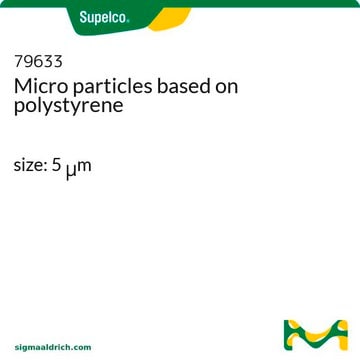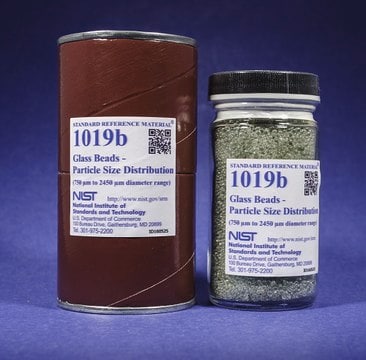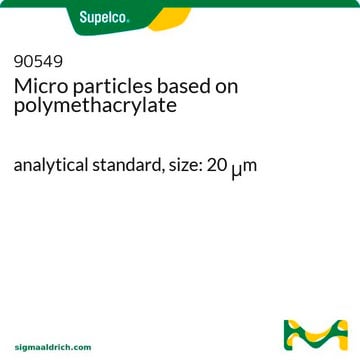44054
Micro particles based on silicon dioxide
size: 5 μm
Synonym(s):
Silica dioxide microsphere (5 μm), Micro silicon (5 μm), Beads based on silicon dioxide, microsize, Silicon dioxide beads
About This Item
Recommended Products
grade
analytical standard
Quality Level
form
aqueous suspension
concentration
5% (solids)
particle size
5 μm std dev ≤0.35 μm
application(s)
glass & ceramic
industrial qc
pharmaceutical
format
neat
storage temp.
2-8°C
SMILES string
O=[Si]=O
InChI
1S/O2Si/c1-3-2
InChI key
VYPSYNLAJGMNEJ-UHFFFAOYSA-N
Looking for similar products? Visit Product Comparison Guide
General description
The particle diameter of 5 μm is measured using Coulter Multisizer.
Application
- to study transport properties of microscopic particles via heterogeneous media
- as a test standard to validate denoising method used in optical diffraction tomography
- in accelerated annealing experiments involving colloidal silica monolayers
- to evaluate the measurement accuracy of color-coded LED microscopy (cLEDscope) technique
- as a calibration standard in optical trapping system to measure surface mechanical properties
Features and Benefits
- suitable for routine instrument calibration monitoring, testing and corrections
- particle size traceable to Community Bureau of Reference (BCR) standards
- available in 5 mL pack size as a neat sample
Storage Class Code
10 - Combustible liquids
WGK
WGK 2
Flash Point(F)
Not applicable
Flash Point(C)
Not applicable
Personal Protective Equipment
Certificates of Analysis (COA)
Search for Certificates of Analysis (COA) by entering the products Lot/Batch Number. Lot and Batch Numbers can be found on a product’s label following the words ‘Lot’ or ‘Batch’.
Already Own This Product?
Find documentation for the products that you have recently purchased in the Document Library.
Customers Also Viewed
Our team of scientists has experience in all areas of research including Life Science, Material Science, Chemical Synthesis, Chromatography, Analytical and many others.
Contact Technical Service






